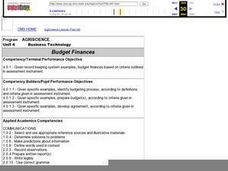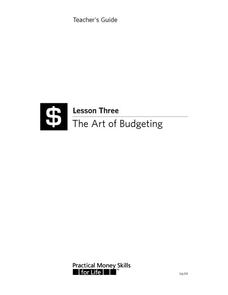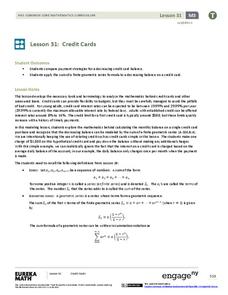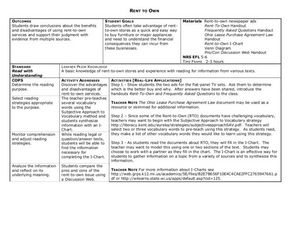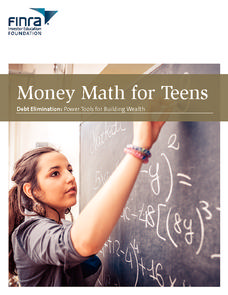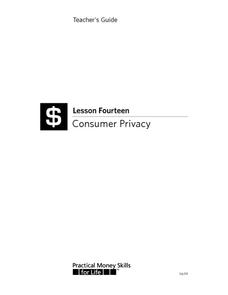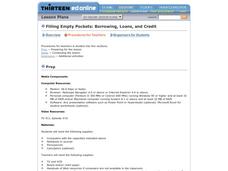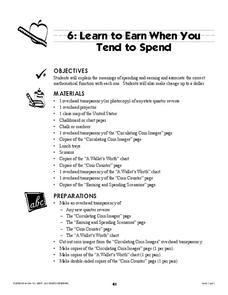Curated OER
Budget Finances
Learners role play the role of a recent graduate of high school living on their own. Using play money, they are given one month's salary and they discover they own their own house or apartment and owe money on a car loan. They develop...
Visa
The Art of Budgeting
Class members learn how to set up and maintain a personal budget through discussion, financial planning worksheets, and a brief PowerPoint presentation.
EngageNY
Credit Cards
Teach adolescents to use credit responsibly. The 32nd installment of a 35-part module covers how to calculate credit card payments using a geometric series. It teaches terminology and concepts necessary to understand credit card debt.
Curated OER
Rent To Own
Reading can be a good way to learn about many different things, like rent-to-own housing programs. Learners read informational resources about rent-to-own programs and how they work. They complete graphic organizers using the facts they...
Curated OER
Trip to the Greenbrier
Tenth graders explore the Greenbriar Resort. In this budgeting lesson, 10th graders plan and calculate the cost of trips from their home to the Greenbriar Resort.
Curated OER
Shopping!!!
Students explore money management. In this financial awareness lesson, students are given an amount of money and a sheet of objects to choose from to buy. Students choose only five objects they can afford to "buy."
Curated OER
Checks and Balances
Students discuss elements of financial planning. For this personal finance lesson, students practice filling out personal banking information. Students conduct research using the Internet and a PowerPoint presentation to find...
Money Math for Teens
Debt Elimination - Power Tools for Building Wealth
What does it mean to be wealthy? Your learners will consider how carrying debt affects budgeting, and learn about the debt snowball strategy and how is it used in the concept of eliminating debt in order to build wealth.
Illustrative Mathematics
Setting Goals
Setting financial goals is a common occurrence in middle school that your learners can practice using this activity. They will be able to solve for how many hours Seth needs to work to save up for a skateboard, helmet, and trip. The...
Visa
In Trouble
What are some of the financial risks associated with using credit? Pupils learn the warning signs of incurring financial hardship, and through PowerPoint presentations, worksheets, and discussion, discover the...
Visa
Consumer Privacy
The availability of personal financial information is of greater importance now than ever before. Your pupils will discuss how public and private records are accessed by various organizations, particularly considering direct mail, credit...
Visa
Buying a Home
What is the difference between buying and renting a home? Learners become more informed consumers and financially literate adults after developing foundational knowledge of the home-buying process.
Curated OER
Savings Account Introduction Lesson
This teaching tool promotes a practical understanding of basic mathematical skills by having learners determine percents on interest. There are several worksheet options available as well as a guid on how best to use them.
Curated OER
Buying a Car
Middle schoolers learn how to manage their money. They view a PowerPoint presentation with instructions for researching and buying a car, select cars for themselves based on their budget, and respond to questions about the activity.
Curated OER
Money: Bucks, Banks, and Business
Put economics and currency exchange rates into a real-world application kids can understand. They'll compare bus fares from various cities around the world. Each child selects three international cities to research. They determine the...
Federal Reserve Bank
“W” Is for Wages, W-4 and W-2
Don't let your young adults get lost in the alphabet soup of their paychecks and federal income taxes. Using sample pay stubs and reproductions of government forms, your class members will identify the purpose of such forms as a W-4 and...
Curated OER
Money Smart Choices
High schoolers make choices regarding money management. In this personal finance lesson, students explore budgets, incomes, and expenses as they learn vocabulary regarding personal finance and consider how to create personal...
Curated OER
FILLING EMPTY POCKETS: BORROWING, LOANS AND CREDIT.
Learners learn that maintaining financial security takes a good math understanding. In this lesson, students apply mathematical formulas to make important financial decisions like getting the right loan to buy a house, decide which...
Federal Reserve Bank
Lesson 4: Back to School
Based on your current level of human capital, how long would it take you to earn $1,000,000? What about your potential human capital? Learners explore the importance of education and experience when entering the workforce, and compare...
Visa
Keeping Score: Why Credit Matters
How does one get credit, and who provides credit? What is a credit score, and how can an understanding of a credit score help you to make smart financial decisions? Through discussion and worksheets, class members will identify the...
Curated OER
Learn to Earn When you Tend to Spend
Analyzing and understanding word problems is extremely important. Pupils learn that in money problems, earn usually means you add and spend usually means you subtract. They will solve a series of money-related word problems, label coins,...
Visa
The Cost of College: Financing Your Education
With college tuition at an all-time high, high school students must consider the financial obligations of attending higher education, as well as the impact of college on future career opportunities. Pupils will complete...
Federal Reserve Bank
Your Budget Plan
What do Whoosh and Jet Stream have in common? They are both characters in a fantastic game designed to help students identify various positive and negative spending behaviors. Through an engaging activity, worksheets, and...
Federal Reserve Bank
Credit Reports—and You Thought Your Report Card Was Important
Get the facts about credit and take a close look at what factors into a consumer credit report with this fantastic lesson. Your pupils will read informational texts, read sample financial documents, and discuss the advantages...


